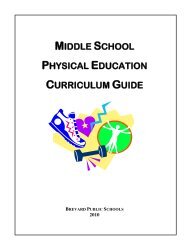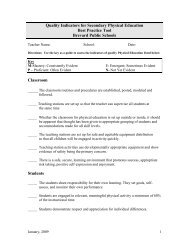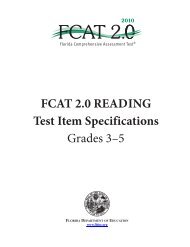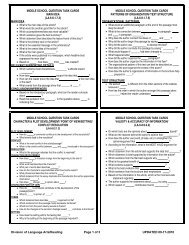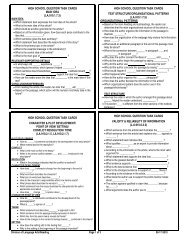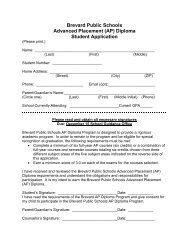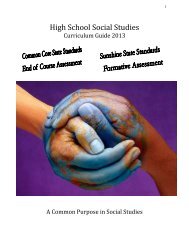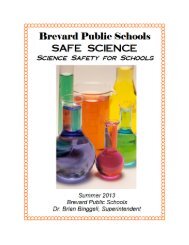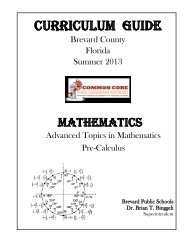Science Research Program Guide - Secondary Programs Home ...
Science Research Program Guide - Secondary Programs Home ...
Science Research Program Guide - Secondary Programs Home ...
You also want an ePaper? Increase the reach of your titles
YUMPU automatically turns print PDFs into web optimized ePapers that Google loves.
� Hazardous Chemicals, Activities or Devices �<br />
(Includes DEA-controlled substances, prescription drugs, alcohol & tobacco, firearms and explosives, radiation, lasers, etc.)<br />
The following rules apply to research that involves the use of<br />
hazardous chemicals, devices and activities. The rules include<br />
substances and devices that are regulated by local, state,<br />
country, or international law, most often with restrictions of<br />
their use by minors such as DEA-controlled substances,<br />
prescription drugs, alcohol and tobacco and firearms and<br />
explosives. Hazardous activities are those that involve a level<br />
of risk above and beyond that encountered in the student’s<br />
everyday life.<br />
These rules are intended to protect the student researcher by<br />
ensuring that the proper supervision is provided and that all<br />
potential risks are considered so that the appropriate safety<br />
precautions are taken. Before beginning research involving<br />
hazardous chemicals, activities or devices, be sure to check<br />
with your school, local, or regional fair as more strict rules and<br />
guidelines may be in effect.<br />
Rules for ALL Projects Involving Hazardous<br />
Chemicals, Activities and Devices<br />
1) The use of hazardous chemicals and devices and<br />
involvement in hazardous activities require direct<br />
supervision by a Designated Supervisor, except those<br />
involving DEA-controlled substances which require<br />
supervision by a Qualified Scientist.<br />
2) The student researcher must conduct a risk assessment in<br />
collaboration with a Designated Supervisor or Qualified<br />
Scientist prior to experimentation. This risk assessment is<br />
documented on the Risk Assessment Form (3).<br />
3) Student researchers must acquire and use regulated<br />
substances in accordance with all local, state, U.S. federal<br />
and country laws. For further information or classification for<br />
these laws and regulations, please contact the regulatory<br />
agencies listed below.<br />
4) For all chemicals, devices or activities requiring a Federal<br />
and/or State Permit, the student/supervisor will be expected<br />
to have the permit prior to the onset of experimentation. A<br />
copy of the permit should be available for review by adults<br />
supervising the project and/or the Scientific Review<br />
Committee in their review prior to competition.<br />
5) The student researcher must design experiments to minimize<br />
the impact that an experiment has on the environment, for<br />
instance using minimal quantities of chemicals that must<br />
subsequently be disposed of in an environmentally safe<br />
manner in accordance with good laboratory practices.<br />
6) The following forms are required:<br />
a. Checklist for Adult Sponsor (1)<br />
b. Student Checklist (1A)<br />
c. <strong>Research</strong> Plan<br />
d. Approval Form (1B)<br />
e. Regulated <strong>Research</strong> Institution Form (1C) - if<br />
applicable<br />
f. Qualified Scientist Form (2) - if applicable<br />
g. Risk Assessment Form (3)<br />
Additional Rules for Specific Regulated Substances<br />
There are additional rules for the following regulated<br />
substances:<br />
A. DEA-controlled Substances<br />
B. Prescription Drugs<br />
C. Alcohol & Tobacco<br />
D. Firearms and Explosives<br />
A. DEA-Controlled Substances<br />
The U.S. Drug Enforcement Administration (DEA) regulates a<br />
number of chemicals that can be diverted from their regular<br />
use to make illegal drugs. Other countries may have similar<br />
regulatory bodies; students outside of the U.S. should consult<br />
the drug regulatory agency in their country in addition to<br />
being aware of DEA regulations. DEA-controlled substances<br />
and their schedule number can be found at the DEA website<br />
listed in the Sources of Information at the end of the section. If<br />
a student is uncertain whether chemicals involved in a project<br />
are controlled by the DEA, he/she should consult the listing<br />
of DEA-controlled substances.<br />
1) All studies using DEA-controlled substances must be<br />
supervised by a Qualified Scientist who is licensed by the<br />
DEA (or other appropriate international regulatory body)<br />
for use of the controlled substance.<br />
2) All studies using DEA Schedule 1 substances must have<br />
the research protocol approved by DEA before research<br />
begins. Schedule 2, 3 and 4 substances do not require<br />
protocol approval by DEA.<br />
B. Prescription Drugs<br />
Prescription drugs are drugs regulated by federal or country<br />
laws and are available only through a pharmacy to protect<br />
against inappropriate or unsafe use. Therefore, special<br />
precautions must be taken in their use for a science project.<br />
1) Students are prohibited from administering prescription<br />
drugs to human subjects. (see p. 14)<br />
2) Administering any prescription drug to vertebrate animals<br />
must be done under all appropriate vertebrate animal rules<br />
and guidelines. (see p. 17)<br />
C. Alcohol and Tobacco<br />
The U.S. Alcohol and Tobacco Tax and Trade Bureau (TTB)<br />
regulates the production of alcohol and distribution of alcohol<br />
and tobacco products. Many such products have an age<br />
restriction for purchase, possession and consumption.<br />
Students outside of the U.S. must additionally adhere to their<br />
local and country laws and regulations.<br />
The Designated Supervisor is responsible for the acquisition,<br />
usage and appropriate disposal of the alcohol or tobacco used<br />
in the study.<br />
1) Production of ethyl alcohol is allowable in the home under<br />
the supervision of the parents and must meet the TTB<br />
home production regulations.<br />
International Rules for Precollege <strong>Science</strong> <strong>Research</strong>: <strong>Guide</strong>lines for <strong>Science</strong> and Engineering Fairs / 2008-2009 Page 25



